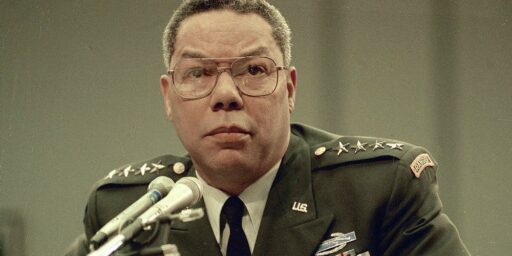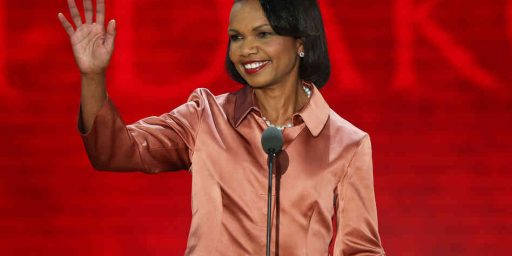CONDI’S IMAGE TAKES HIT
WaPo’s Dana Milbank and Mike Allen have an interesting piece on the internal politics of the Niger-yellowcake flap that begins:
Just weeks ago, Condoleezza Rice, President Bush’s national security adviser, made a trip to the Middle East that was widely seen as advancing the peace process. There was speculation that she would be a likely choice for secretary of state, and hopes among Republicans that she could become governor of California and even, someday, president.
But she has since become enmeshed in the controversy over the administration’s use of intelligence about Iraq’s weapons in the run-up to war. She has been made to appear out of the loop by colleagues’ claims that she did not read or recall vital pieces of intelligence. And she has made statements about U.S. intelligence on Iraq that have been contradicted by facts that later emerged.
The remarks by Rice and her associates raise two uncomfortable possibilities for the national security adviser. Either she missed or overlooked numerous warnings from intelligence agencies seeking to put caveats on claims about Iraq’s nuclear weapons program, or she made public claims that she knew to be false.
While this is true as far as it goes, it is based on a common fallacy that one would think Milbank, a highly respected veteran journalist, wouldn’t fall for: confusing the job of a manager with that of their subordinates. While true that Rice is the president’s chief advisor on security matters, she is not a professional intelligence analyst. She’s an academic with a sharp mind, an expertise in the former Soviet Union, and some Washington experience. Her job is to coordinate the NSC staff, not to read every last report that comes in down to the footnotes. The National Intelligence Estimate highlighted the Niger story; a dissenting view was noted in an annex. It’s not that surprising that she missed it.
(Hat tip: Ogged)
Update (1331): A bit of clarification/extension: The NSA is a coordinator whose function is to manage the interagency process with respect to security matters; to this extent, Rice indeed failed. But the National Security Council is merely a staff. The so-called Principals Committee, in which the key decisions are made, consists of the President, Vice President, NSA, Secretary of State, Secretary of Defense, CIA Director, and Chairman of the Joint Chiefs of Staff. So, both DCI Tenent and SecState Powell had the opportunity to voice any objections to the reports. Indeed, Powell, who heads the agency which most strenuously objected to the Niger intelligence, seems to be getting no criticism.






Wow. This is perhaps the weakest and somewhat patronizing take on Ms. Rice I’ve seen: she’s a manager not an intelligence professional.
The job of National Security Advisor is to collect and, hopefully, mold all national security-cognizant info (from a wide variety and often competing group of sources) into a coherent and effective national security policy.
That’s Ms. Rice’s job; and while it’s not to be expected she would read each piece of documentation that might pass through her organization, one would hope she and her staff might pay more than passing attention to the issue of whether or not Saddam Hussein possessed a viable nuclear weapons program. After all, we’re not talking about some inter-agency disagreement over the 2002 bauxite production levels in Bolivia–we’re talking about a rationale to commit US troops to war.
More troubling is the fact Ms. Rice lied by claiming the NSC had never been apprised of the CIA’s doubts WRT Niger-uranium story. Even if we accept the rather silly notion of National Security Advisor as no more than a manager, it seems a good manager might have polled his or her staff about the issue prior to issuing several flat denials.
Guy–aren’t you confusing the possibility of uranium being purchased in a particular place during a particular timeframe with the potential for a nuclear weapons program? It seems you’re extrapolating from one detail to a much larger picture.
Not that this is uncommon these days.
I think your assertion that the entire rationale for war rested on the possible uranium purchase shows your bias. This war was never about nuclear capability. It was about a defiance of U.N. resolutions that was real. Whether or not there was a good reason for it to happen, it happened.
Miss Atilla–I don’t believe I’m confusing the two issues although it’s entirely possible my tortured prose may have led some to that conclusion. Once again into the breech: this administration attempted to demonstrate Saddam possessed, or at least was close to possessing, a viable nuclear weapons program. To bolster this assertion, they used the Niger-raw uranium fiction which had been previously discredited on at least 3 instances by the CIA. Further, we are all familiar with Ambassador Wilson’s findings. They also used the discredited aluminum tube story as well.
Second, I never claimed the entire rationale rested upon the bogus Niger-uranium claim and don’t see how one might have surmised such from my post. Instead, I **would** say most of the claims WRT WMD and terrorism made by this administration were either lies or gross exaggerations. If that shows my bias, so be it. I’d only ask that you review what administration officials were saying before the invasion (esssentially, they knew Saddam had massive amounts of WMD–ready to deploy immediately–and they knew where they were)and what we know as reality in the aftermath.
As to your claim this war was about defiance of UN resolutions, I can only laugh and ask that you take another look at the “coalition of the coerced and bought off.”
Dave,
No. The people at the top, ultimately the president, are responsible for what happpens in any Administration. But one has to recognize the limits of span of control, too.
Bush isn’t responsible for intelligence analysis, because that’s not what he does. He is responsible for who he appoints and what he does with the info he has. The electorate decides next November whether to retain him.
Rice is responsible for overseeing the collaboration on security issues, but not necessarily the detail work. There is only so much time anyone has. She’s responsible for who she hires and answers to the president. If he’s happy on balance with her work, he keeps her. If not, she’s history.
Also, given the composition of the National Security Council, there is shared responsibility. Tenet and Powell, most notably, bear at least as much blame as Rice on this one.
Mr. Johnson raises an important point I neglected to mention; ultimately, the buck has to stop somewhere.
Obviously, Mr. Joyner and Miss Atilla believe that since George Bush is not an intelligence professional, he should be absolved of all blame. Apparently, since Bush isn’t an economist either, we can excuse his performance in that area as well. Perhaps there will come a time when America is confronted with the issue of making a financial windfall from the name of our parents and, finally, Bush will claim some responsibility.
The “span of control” argument fails when we understand Ms. Rice isn’t some GS-12, in some obscure cubicle at the Dept. of Agriculture, debating the sorghum levels in Iowa’s Pitchfork County. Instead, Ms. Rice enjoys inner-circle access to Bush and would certainly be (or should be)among a very small group providing input to such a momentous decision as to commit troops in a war.
Guy,
But GS-12s are only responsible for small numbers of subordinates if any at all.
The only thing Rice is charged with doing here is allowing a line to get in a speech that was the consensus view of 4 of 6 major intelligence agencies without making note of the two dissenters. No one is blaming Colin Powell, head of the agency which was filing the strongest dissent–and who also sits in on NSC meetings–for not speaking up. And, BTW, the Brits are still standing behind the Niger story.
Mr. Joyner, you’re soft-pedalling the issue. As in all good scandals, often it’s the lies about the lie that lands you in hot water.
Let’s review, shall we?
First, Ms. Rice, WRT the SoTU 16 words, said “no one in our circles knew that there were doubts and suspicions that this might be a forgeryâ€Â
A month after Ms. Rice asserted nobody knew, the WH acknowledged they had received 2 memos from the CIA, 3 months before the SoTU, which cast strong doubts about the story re Iraq’s effort to buy nuclear material in Africa.
Ms. Rice also noted , WRT to the SoTU’s 16 words, that Tenet had cleared the speech and never voiced any misgivings. Yet, Rice’s number two, Stephen Hadley later admitted he received 2 memos (one which was directed to Rice) and a phone call from Tenet in OCT which did express strong misgivings.
The story then changes, yet again. Ms. Rice and Bush now admit that–‘well, yes, we did get information that cast significant doubt as to the Niger-uranium story–but we didn’t read it.’
And when you add in the fact Dick Cheney directed the CIA to check out the Niger story (see Ambassador Wilson)–it’s pretty inconceivable the top levels of this Govt. were unaware the story didn’t pass the smell test.
As to Powell’s culpability, it’s not his job to vet National Security info–it’s Ms. Rice’s. However, if you wish to hang Colin Powell out to dry, you’ll not get an argument from me; after all, he’s told some whoppers WRT Iraq’s WMD himself.
—